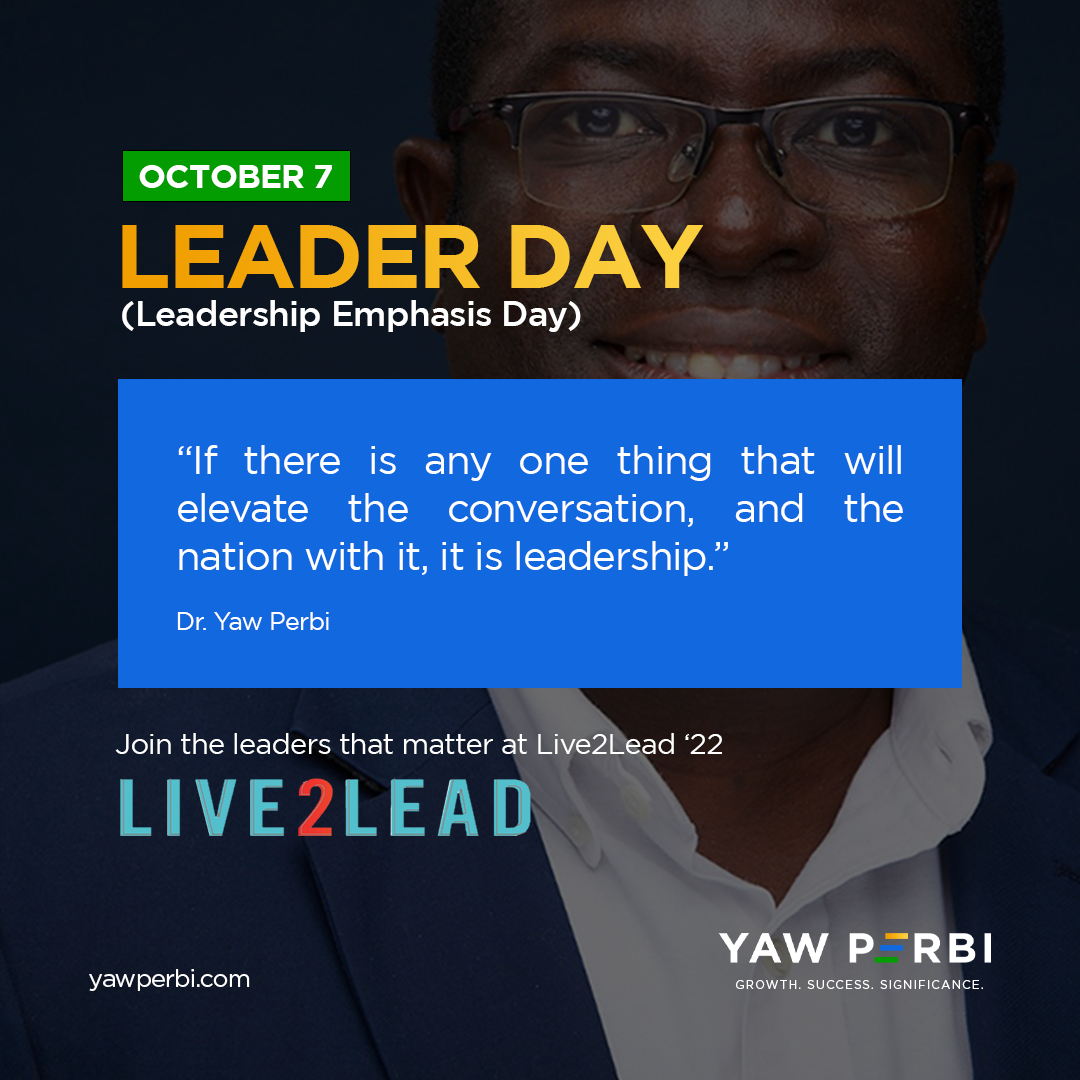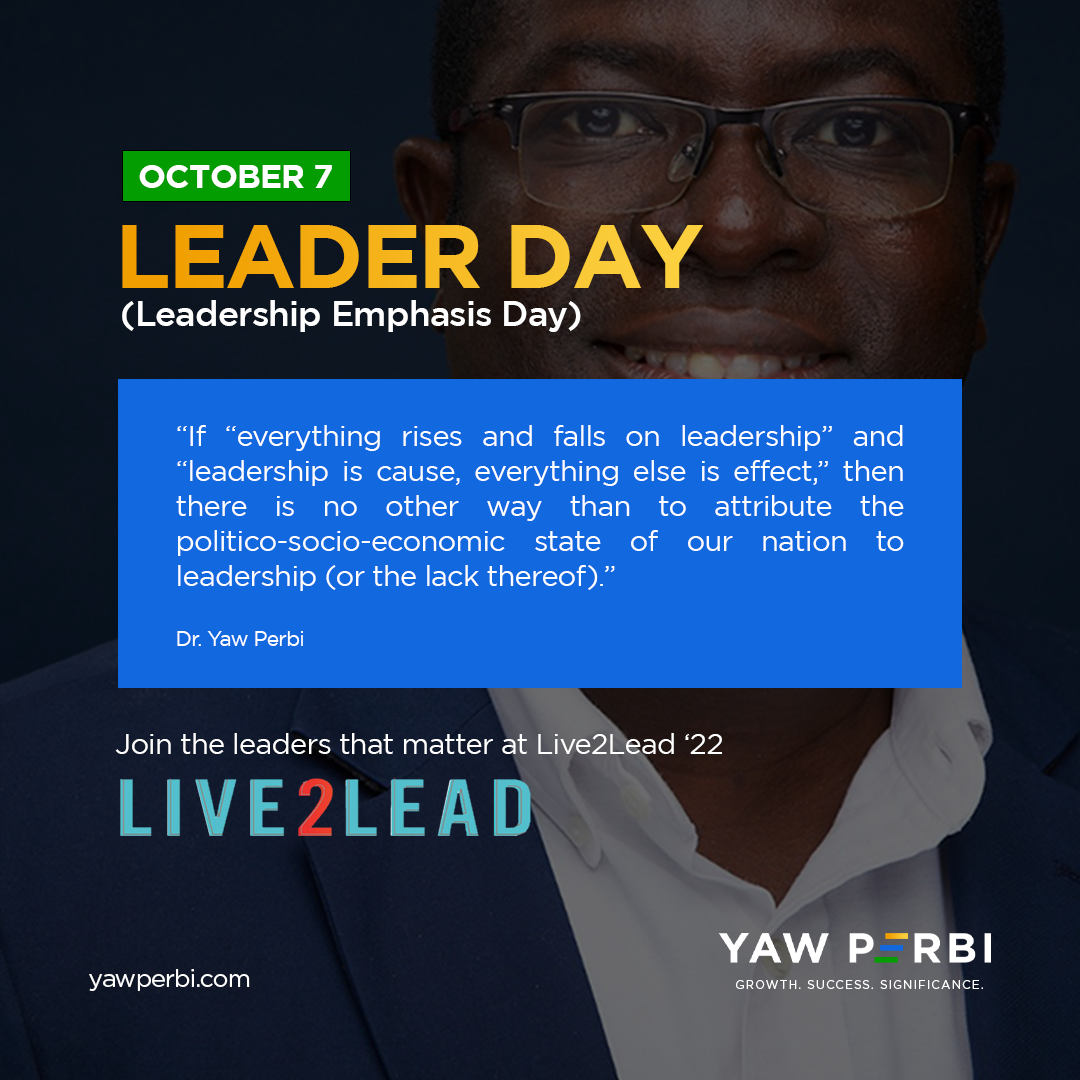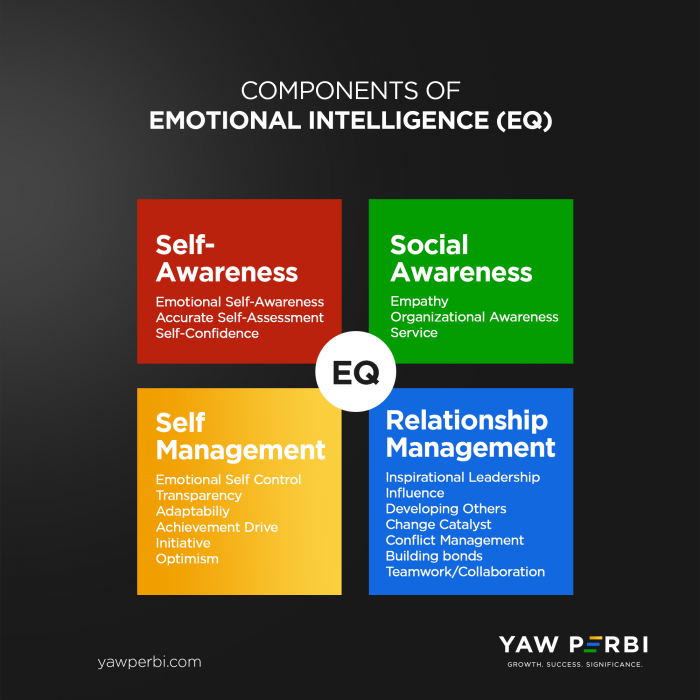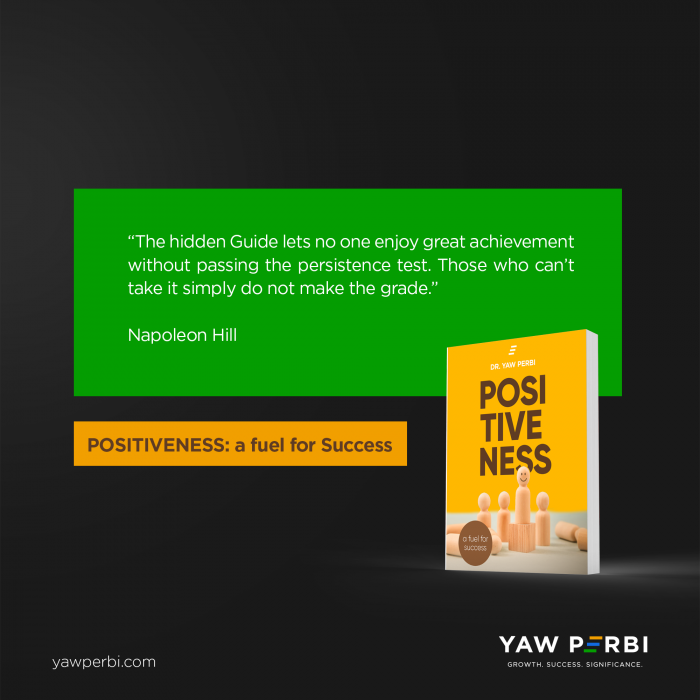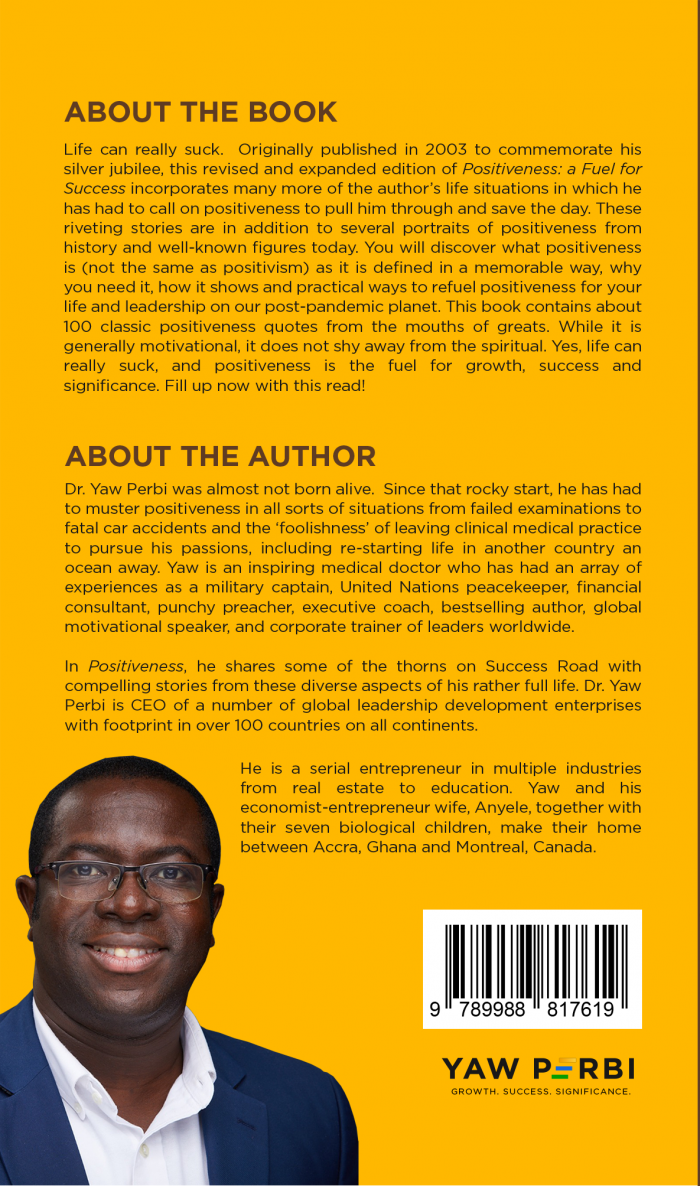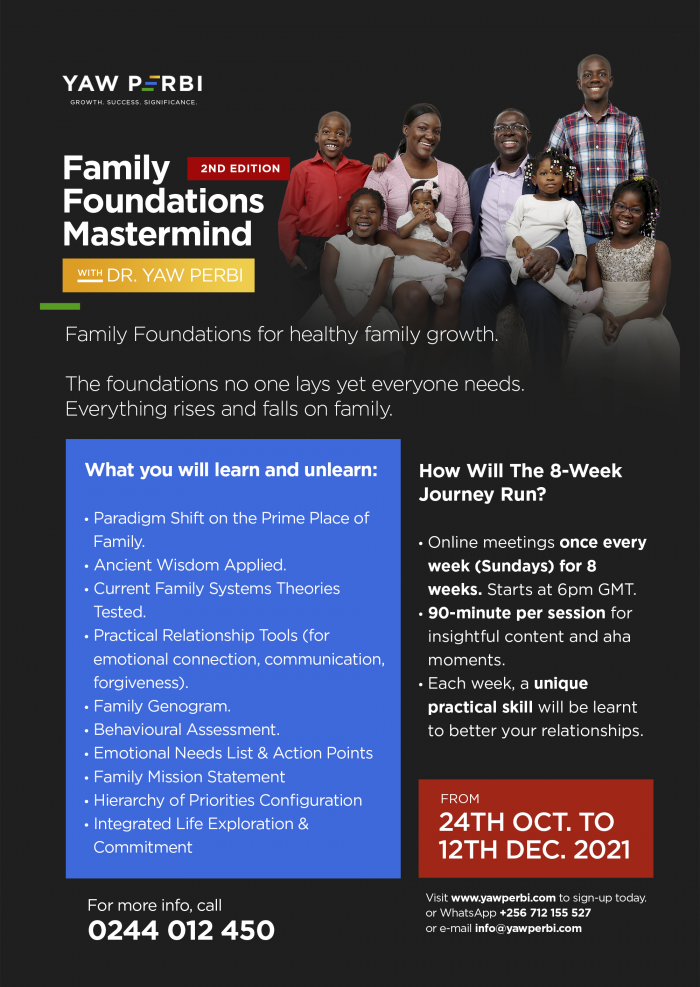
Raise the Roof, Lift your Lid!
I just arrived at my room in Cape Town after three flights from Accra to Nairobi, Nairobi to Johannesburg and Jo’burg to Cape Town. A question on my mind as l flew here far above sea level, sometimes as high as 38,000 feet, has been, “How high is your leadership lid?”
THE FIRST OF THE IRREFUTABLE LAWS OF LEADERSHIP
Of course you know what a lid is, the cover of a container. How high your lid is determines the quality of the leadership that you provide for those you lead. I learnt this a long time ago, some 20-25 years ago from John Maxwell’s 21 Irrefutable Laws of Leadership. It was the very first of the principles of leadership he espoused in that bestseller and my life has never been the same since.
As John challenged me then from the written word—and many years later in-person—I must always endeavour to lift my leadership lid because no family, organization, church, community or country would ever grow past their leader. The leader is the lid over those (s)he leads. Sometimes when training leaders I ask, “are you a leader or ‘lidder’? because a leader is literally the lid on the progress and prosperity of their constituency. In a sense, every leader is a lidder; the question is “how high?”
IMAGINE THIS PRESIDENTIAL LID
You probably have heard me tell the story of a certain African president that a group of us, Maxwell certified leaders, were trying to connect in-person to John C. Maxwell for a national transformation process and programme. This president had never heard of John. In all probability, he hadn’t read any other contemporary leadership experts but hopefully he has digested at the very minimum some of the leadership classics like Plato’s, ‘The Republic’. It is a scary thought that this African nation—and by extension every family, organization, corporation, community, church etc. within her—would be constrained by the tightness of this head of state’s lid. I almost added, “through no fault of theirs,” but I guess they voted him into power.
HOW TO LIFT YOURS
While we educate a new generation that should be too enlightened to allow such tight lidders to lead African nations in the next decade, let me ask you, let’s get personal: how high is your lid? We forget, many of us (or we might even not know), that leadership is not just caught, it must be taught. And that’s why I love the opportunity, come October 07, for us all to be part of a life-altering, lid-lifting Live2Lead virtual experience with local faculty and global ones beaming all the way from Atlanta, Georgia.
We are gunning for 2,000 leaders—from emerging (youth) leaders, through leaders in the establishment (i.e. government/public sector leaders) to established leaders in the private sector, including executives from the corporate space. We will be taught in word and deed by powerful speakers and shakers like John C. Maxwell himself, two Patricks (Lencioni of the USA and Awuah of Ghana) and a Patricia (CEO of Vodafone, Ghana).
RAISE THE ROOF!
One of the most powerful discoveries in psychology over the last generation has been that people can learn and grow and change! So wherever your lid is today, if you learn to lead better you provide more room for those you lead. John will be the first to tell you that “your capacity determines your impact.”
Perhaps, some of the conflicts you are experiencing right now in your organization, church or wherever you lead is because your lid is too low and so people keep hitting it. And there is going to be continued tension and banging (conflict) till at some either you leave the stage or your people take their exit. As you have probably heard it said, people join organizations but they leave people (managers/leaders). It’s time to make room, lift your lid, raise the roof!
I have been part of things l left because the lid was too low. It just wasn’t life giving and l know people have also left my leadership when my lid was low because it was just too tight. Learn to lead. Each one of us can learn to lead better. Blow off the lid so that all of a sudden the people under your leadership feel this space and freedom because you lifted your lid and now they can breathe and create and innovate and… live again.
Join us at Live2Lead Ghana 2022, on October 7, and let’s all learn to lead better so that the people following our leadership can live better. If leading is your purpose on earth—that you live2lead—then you might as well as learn2lead, and do it well. As Donewell Insurance puts it, “If it must be done, it must be done well.” If we must lead, then we must lead well. Let’s blow off some lids and see our constituents blessed beyond measure, growing great and strong.
Right outside my hotel room window is the breathtaking view of the majestic, towering Table Mountain at 3,500 feet above sea level with no real ‘peak’ per se. No lid! So in the meantime, while you contemplate your lid, I will enjoy Cape Town on your behalf.
Post Script
Register and join LivetoLead here.
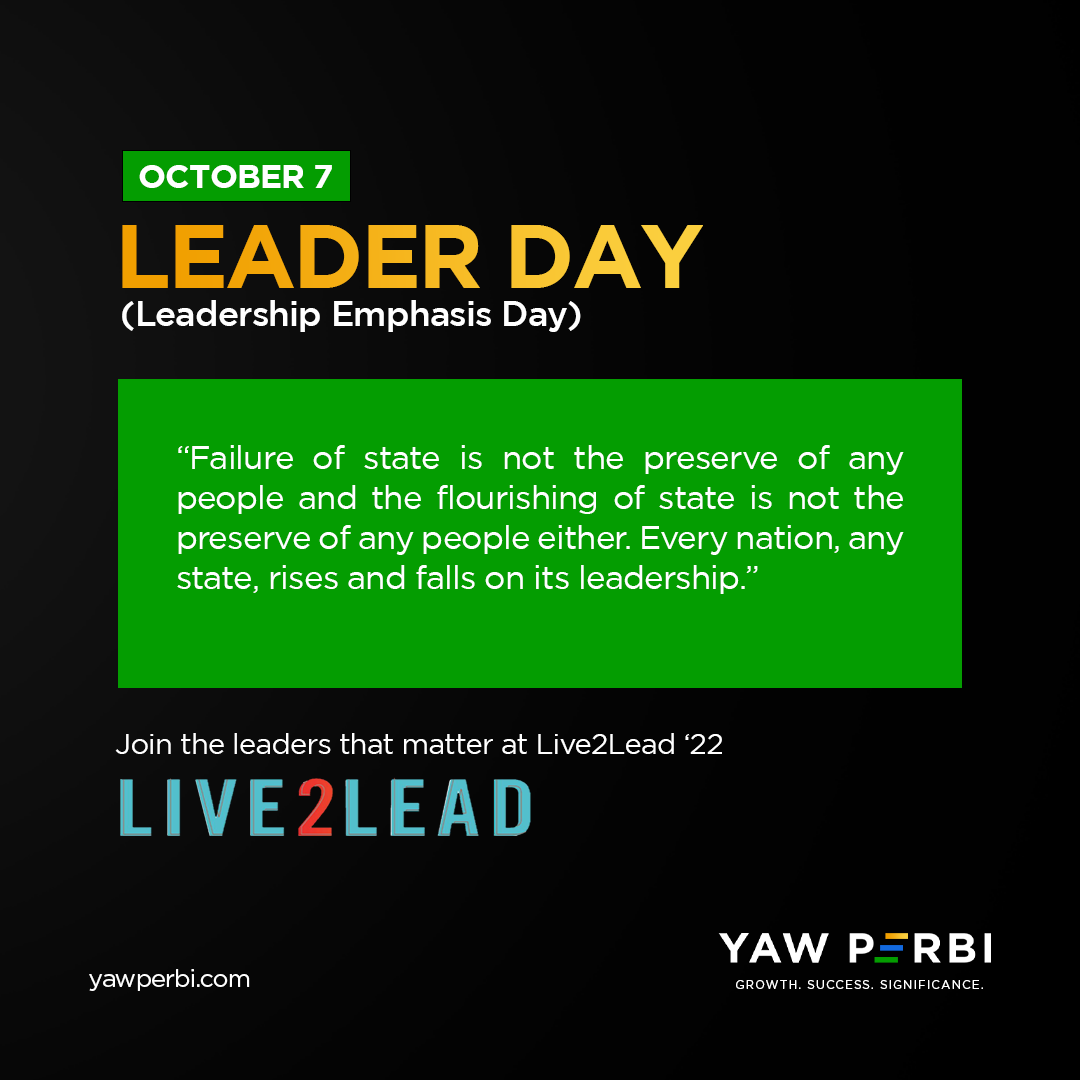
Of Principles, Principals & Principalities
This is a true story: A few years ago, a handful of us John Maxwell-certified coaches and trainers from Africa were trying our possible best to get John, the world-famous leadership expert, to visit a particular African country and engage their president. A good number of Maxwell-certified leaders have been travelling with John to specific developing countries to engage them in a bottom-up transformation process that have done these nations some real good and we hoped same for this African nation with great potential. But John doesn’t come cheap. In fact, one of us was serious enough about this that he cashed in part of his 401k (retirement savings in the U.S.) to make this trip possible. It was such a struggle to gain access to the president, like pulling teeth! Eventually we did. To my ‘shock and awe’ (just remembering U.S. President Bush Jnr.), this African president did not even know of John Maxwell! That is when I knew the country wouldn’t do well. And I was right.
LEADERSHIP IS THE TIDE
Over the last few years, especially with the Trump presidency and with the advent of social media proliferation, many of us have seen parts of the United States that we have never seen before. Horrible parts and horrific things—whether it is the wicked knee of a policeman on George Floyd’s neck or violent street protests or the infamous January 6 ‘insurrection’ or whatever it is. We had all this exposure to things we could not hitherto have imagined occurring in the ‘greatest nation in the world.’ At the peak of these happenings, during the Coronavirus pandemic, I frantically tried (see January 2021 article) to get some of my American friends to appreciate that Africans are no less human or merely more stupid than they are, and that if there is a difference between their economic status and my motherland’s it was just because, “everything rises and falls on leadership.” Leadership is the tide the raises all the other boats in a society (or otherwise). Most of them, I perceived, didn’t still quite get me.
AFRICA IS NOT THE PROBLEM
Just like we’ve seen in the last few years in America, we’ve also seen in several countries in Europe how “leadership is cause; everything else is effect.” I’ve lost count of how many Prime Ministers Britain has had in the last little while, and we all witnessed with horror the leadership (or the lack thereof) of the last one with the Russian first name. Africa is not the problem, leadership is. Failure of state is not the sole preserve of any nation neither is the flourishing of state the preserve of any nation. Every nation, any nation, rises and falls on its leadership.
“WE THREE KINGS”
These three kings are at work in nation building: Principles, Principals and Principalities. If you like, these actors are Laws, Leaders and Luciferites. Principles are neutral, Principals are supposed to be working for their people while Principalities are against. There are principles that touch on every aspect of life, including leadership. When these principles or laws–which are timeless, universal truths–are lived out, nations do well, families flourish, churches and organizations prosper. When they are broken we don’t.
It is easier to appreciate the physical and chemical principles because we can see and feel and touch them and their consequences. The Law of Gravity is the commonest example of a principle of Physics (physical law). There are leadership principles as well. Many of these are intangible in their operation but produce very tangible effects reflected in socioeconomic and other indices. Nations that live by principles, these consequential laws of the universe that make this world run properly, prosper and nations that do not live by principles don’t. The nations whose principals (leaders) live by these principles prosper; those that don’t do not suffer. It bears repeating that this applies to families, communities, churches, organizations… you name it.
WHERE DEMONS COME IN
Of course, those of us who believe in spiritual things know that over every nation and territory there are also what we call Principalities (Lucifer’s forces). These ‘Luciferites’ (I call them), are spirits that have territorial control that want to oppress nations and not let them come to their full manifestation. Why, you may ask? Out of envy of humans and out of spite for their Creator. But guess what? If you have principals (leaders) who live by principles (laws), including spiritual principles on how to deal with these powers, those nations, those families, communities, churches, organizations and countries of such leaders would bloom.
STOP THE BLAME GAME, NOW
Africans! let’s stop blaming how socioeconomically bereft we are on Principalities. It is our lack of following Principles—all of us—and particularly the lack of our principals leading in a principle-based manner as they should that has landed us where we are. We have an opportunity on October 7, all of us, to learn more of these principles as principals, whether we are executives in companies, pastors of churches, student leaders, public sector actors or whatever. We must all learn to lead better. When the leader gets better everything everyone else gets better.
It’s time to take on the principalities (Lucifer’s powers) that are oppressing and not making us prosper as nations and communities and it would come from the principals (leaders) who would live by the principles (laws) of leadership and lead the rest of us to do same. Don’t blame the principalities—and you can’t blame the principles either—it all lies on the principals. Principles are fundamental laws that cannot be changed and must be lived by to prosper. Principalities are spiritual powers that can be challenged to let things “be on earth as it is in heaven.” Neither principles nor principalities are respecter of persons, whether principal or peasant. Nations with great principals (leaders) abide by principles (laws) and defy spiritual principalities (Luciferites) to make their nations prosper. How laudable is your leadership?
Remember the nation whose principal-in-chief was clueless about leadership principles, at least as taught by Maxwell? I feel sorry for his people as I see and hear of their plight each day, worsened by the Coronavirus invasion of our planet. It’s not the devil; it’s our leaders. As one medical colleague pursuing Paediatric Pulmonology in South Africa poignantly commented on my PEP Talk on YouTube about this matter, “Once our Principals follow Principles and we the led are inspired, we will be too busy prospering to blame Principalities.” Enough said. Are our principals hearing?
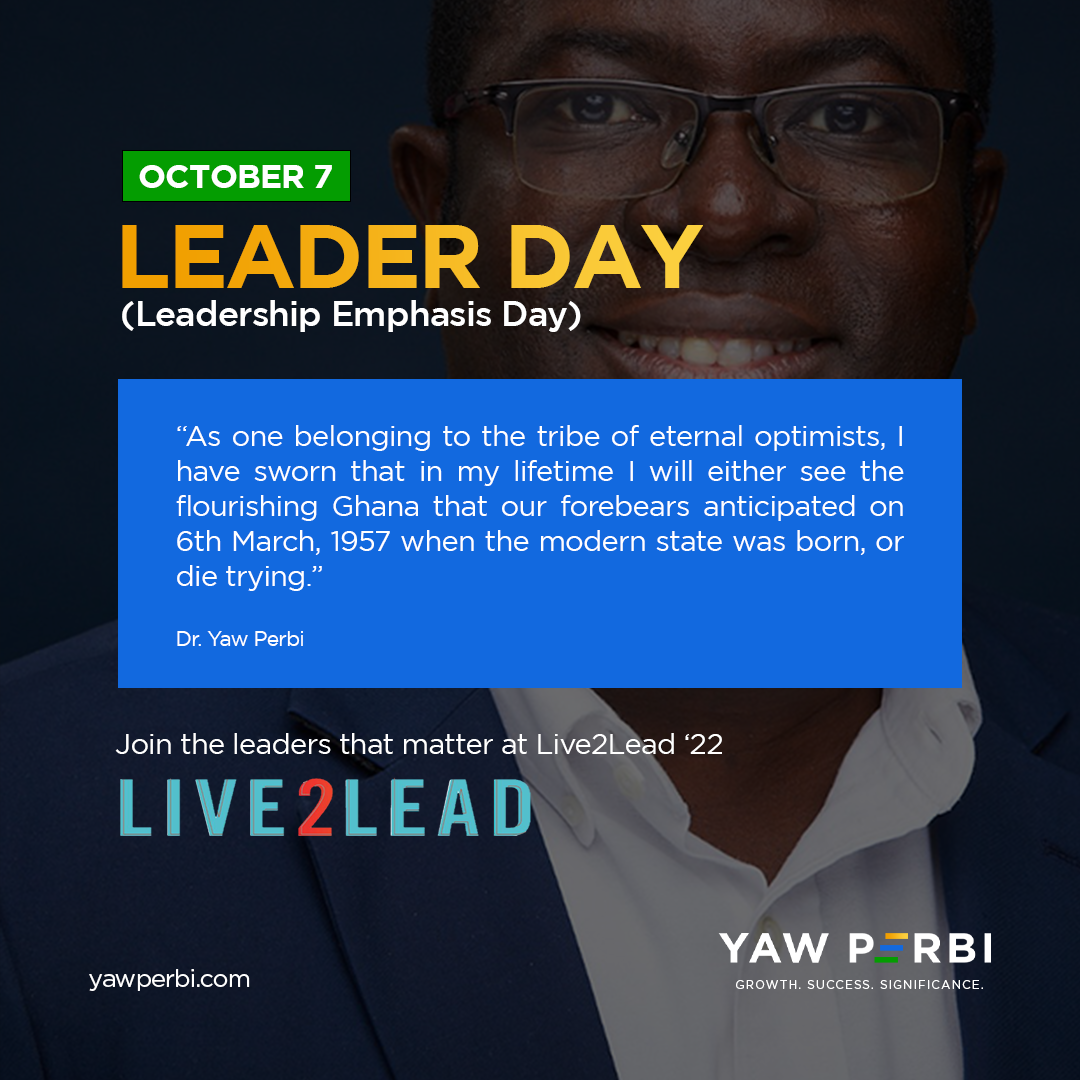
Leader Day, October Day
The world is not in a good place. Leadership is the cause. And when it comes to Ghana’s situation in particular, I have personally been shocked at the number of C-level leaders I have interacted with that have either completely lost hope in the future of the country or nearly have. “How did we get here???” one CEO of a major bank asked me via text (yes, with three question marks).
If “everything rises and falls on leadership” and “leadership is cause, everything else is effect,” then there is no other way than to attribute the politico-socio-economic state of our nation to leadership (or the lack thereof). In the same way, if there is any one thing that will elevate the conversation, and the nation with it, it is leadership.
DO OR DIE TRYING
As one belonging to the tribe of eternal optimists, I have sworn that in my lifetime I will either see the flourishing Ghana that our forebears anticipated on 6th March, 1957 when the modern state was born, or die trying. When the nascent nation was named ‘Ghana,’ our great grandparents were hopeful it would reflect the prosperity of the old Ghana empire, hence our new name (from Gold Coast). Oh, it bears repeating: our tribe of eternal optimists will see to a prosperous Ghana in our lifetime or die trying.
“I HAVE A DREAM, I HAVE A DREAM…”
Every true leader has a dream they passionately pursue with their people. I realize there is a day dedicated to almost every cause under the sun and pretty much each of the Sustainable Development Goals (SDGs)—women’s day, water day, literacy day, friendship day, founders day … even toilet day. Yet the one thing that causes each of these matters to rise or fall has no such day dedicated to it to elevate and emphasize it. Even then, is a day enough? Surely not; but it is a good catalyst for the remaining three hundred and sixty four (or five) days.
My fellow Maxwell-trained and certified collaborators in Ghana and I have a dream that ultimately the first Friday of October each year will become universally known as LEADER DAY. There is nothing special about the first Friday in October per se except that consistently for about a decade now, our mentor and leadership expert, John C. Maxwell, has been gathering some of the best leadership minds and hearts on the planet to speak to the issue, and we might as well leverage the opportunity rather than reinvent the wheel. Live2Lead is the name of that event. The name says it all, that’s our purpose on earth: We live to lead.
Gwen Addo, the pulchritudinous CEO of the Hair Centre and speaker at Live2Lead Ghana ‘22 affirms this vision: “I also pray your dream comes true and October 7 becomes a “leadership day” or perhaps October becomes a “leadership month.”” She continues, “leadership is close to my heart … and why not dream it bigger than just a day.”
You and I know the dearth of leadership in our country. We, Maxwell certified trainers who are Ghanaian, are aiming to get 2,000 leaders at all levels to benefit from the LIVE simulcast from Atlanta. We will organize local content for our context first, sandwiching the global feed. You would want to be with Patrick Awuah (Founder & CEO, Ashesi University), Patricia Obo-Nai (CEO, Vodafone), Uncle Ebo Whyte (CEO, Roverman Productions), Gwen Gyimah Addo (CEO, The Hair Senta), Kathleen Addo (Chairperson, National Council for Civic Education) and Kwamina Asomaning (CEO, Stanbic Bank). The core issue on the table this time, or shall I say by the fireside, is “Leading with Integrity & Inspiring Hope, for the Common Good.”
STRATEGY
On October 7, we shall convene 2,000 Ghanaian leaders online. At least half of them will be from 100 companies, institutions and organizations which would send 10 of their leaders to Live2Lead as their investment in themselves as well as boldly staking their claim in the prosperity of Ghana by raising the leadership lid in the country, one company at a time. All these companies will be listed as patrons in the event handbook, website and social media (in alphabetical order).
The other half will be made up of executive leaders from the private sector, the establishment leaders (public service) and emerging leaders from our schools and universities, representing the next generation. Companies, institutions and organizations which want to go beyond patron status will be given opportunity to sponsor the establishment and emerging leaders in exchange for significant air time and eyeballs.
This 2,000 is only for starters; we shall double in 2023; and double again and again till at least 2% of all leaders in Ghana are connected to this Live2Lead tribe of learners who lead and leaders who learn. That is the exact critical mass needed to see a self-propagating movement of leaders worth following in Ghana: 2% of the leader population.
CONCLUSION
The feedback from the ground as I have gone around is damning. Ruinous to the extent that although the theme we initially chose for our local content is ‘Leading with Integrity for the Common Good,’ we’ve had to come up with a conjoint theme of HOPE. Our people need hope. Leaders are brokers of hope, thus when they themselves are broken to the extent that they have no hope, what shall the rest of the people do?
Arise Ghanaian leaders!, established and emerging ones alike. We are better than this. Yet perhaps we are expecting leadership behaviours, values and attitudes that we haven’t first trained into people. Since we Live 2 Lead (that’s our purpose) let’s then Live 2 Learn (that’s the process) so we can all lead better and all make our nation great and strong. When the leader gets better, everyone and everything else does too. So let’s all show up!
One day in October, for starters. Just one day but who knows? Perhaps ‘October Day’ will in my grandchildren’s day be as well-known as ‘May Day’ is today. And for even better reasons, leadership-wise.
PS.
An event is not enough for sustained transformation thus there are leadership development and training pathways that will later be shared as a follow-up process between October 7 and the next Leader Day a year hence.
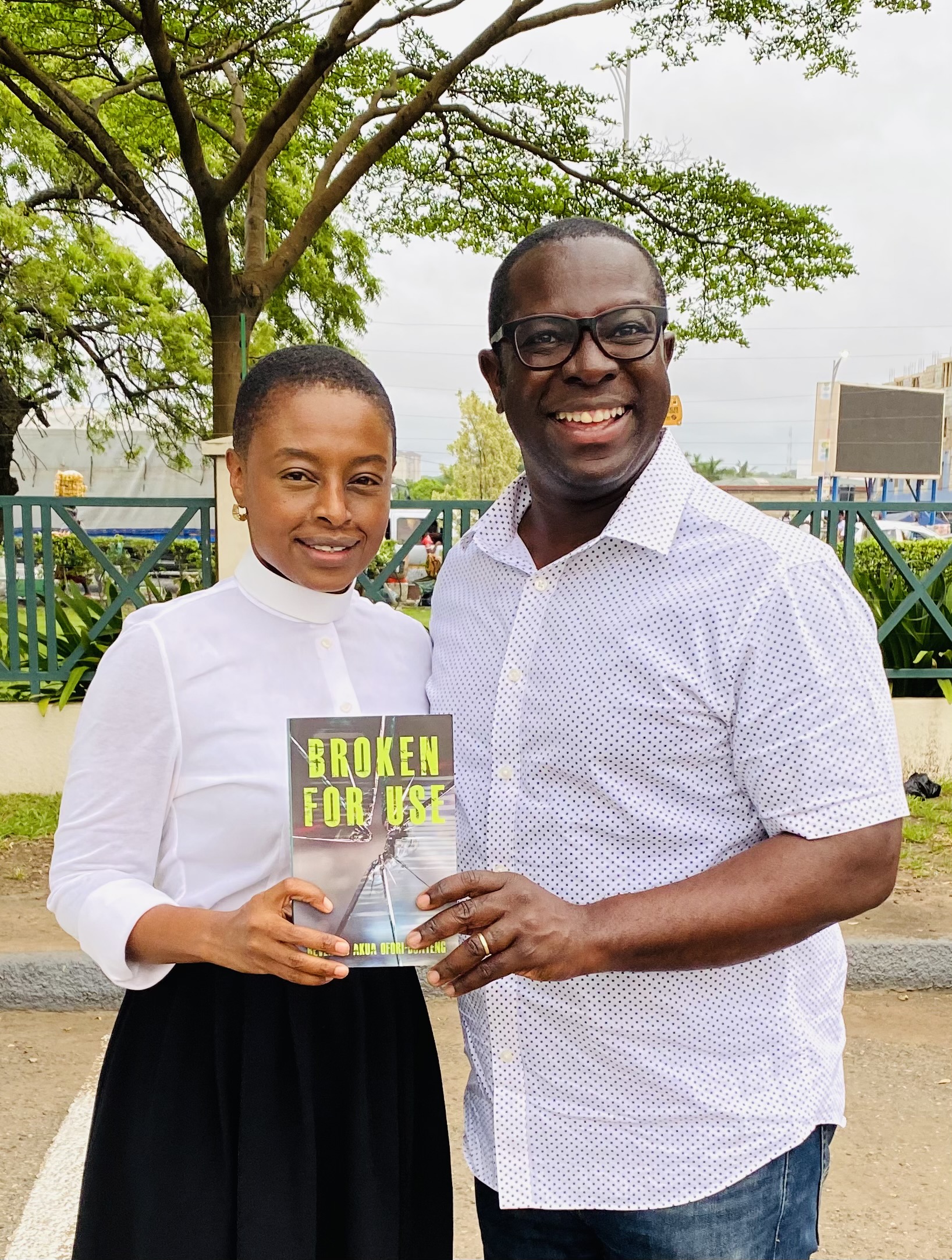
Leading From Life Story
Leadership is an interesting phenomenon. It is a more personal phenomenon than many people realize. I have been studying leadership for a while, at least for the last twenty-five plus years, and one of the greatest discoveries for me has been that leadership is not something ‘up there’ or ‘out there.’ The greatest leaders have been those who have been able to deeply reflect on their life stories and reframe them, leveraging their life stories to lead.
Growing up in Ghana as a student of leadership, a lot of the apt illustrations and gripping stories I consumed were foreign, mainly coming from Western literature and audiovisuals. A case in point is Howard Schultz, CEO of Starbucks, as one of the best examples of how the corporate success of Starbucks is as a result of the reframing of his own life story, especially his dad’s misfortunes. Says Mr. Schultz himself, “The reservoir of all my life experiences shaped me as a person and a leader.” Now, I am really excited that many more Africans are telling their leadership stories and writing, putting them in print. Finally, the lions are learning to write their own tales of the hunt.
MEET THE MECHANICAL ENGINEERING MBA
One of the CEOs in Ghana whose life story has taken a firm grip on me is a young lady I’ve just come to love. First, she’s just an amazing human being, very authentic. Then Akua is a professional in her own right, with a Masters in Mechanical Engineering, an MBA, a third seminarian masters and actually studying for a Ph.D as well. But the icing on the cake for me is this: she is a priest too!
The fascinating story of Rev. Akua Ofori-Boateng is chronicled in her thrilling autobiography aptly entitled ‘Broken For Use.’ It is raw, real, and very vulnerable—perhaps the most vulnerable Ghanaian, or maybe even African, autobiography that I have read.
Akua is CEO of Aequitas, an organization desirous to see every youth find and pursue their passion. She and her team do this by providing internships and safe learning spaces for youth to explore, discover their gifts and find their purpose. And when you have read her story—the intriguing tale of a privileged, middle-class girl yearning for approval—you will immediately understand why she would found and lead such an organization—from her life story!
WHY LEADING FROM LIFE STORY MATTERS
The passion and purpose of your leadership would come from your life story. If you are going to have dedication and commitment to leadership, it will need to come from leading from your life story. If you are going to have inspiration and motivation, it comes from your life story. If you are going to have a true north for your leadership, it comes from your life story.
I am exceedingly glad to be collaborating with her at YAW PERBI to impact youth and C-Level Executives because authentic leadership comes from leading from your story. Watch out for opportunities for collaborative training, coaching, workshops, publishing etc. with the Rev. when it comes to this whole area of authentic leadership. Just before wrapping up lunch with her the other day, I wanted her to share with you why she wrote this book and what it means for her life and leadership. You may watch the short, unrehearsed and upstaged video I captured here or read a transcript of her convincing spiel below:
Rev. Akua Ofori-Boateng: I wrote this book because when I was young and struggling with my own insecurities and challenges, I didn’t have any book like this to read, anything to tell me of that what I was going through was normal and that anybody had been through such. Certainly no one my age was talking about it from being that age. I wrote this so that young people who are struggling and unable to forgive themselves and have made some of the mistakes I made would recognize that we all make mistakes and that there is life after mistakes. The life after mistakes is a good life and a fulfilling one and a life that can benefit other people.
Dr. Yaw Perbi: How has your life story shaped your leadership?
Rev. Akua Ofori-Boateng: My life story and my leadership are inseparable. For me, I lead from a place of what I have experienced. And I want the young people to understand that you are not talking to perfection. You are talking to a person who is giving you advice based on their own issues, mistakes they have made and overcome so I lead from a place of authenticity. I got it wrong and now I’ve got it right; and if you got it wrong, you can get it right too.
CONCLUSION
Notable leadership experts from Bobby Clinton to Bill George have divided life into phases, usually three or four. It takes deep reflection to draw these out for oneself. The power of leading from life story is one of the many reasons why self-awareness is a sine qua non in leadership. There is no authentic or deep leadership without knowing one’s life story and reframing it as a source of inspiration, dedication and commitment, passion and purpose for your leadership. Your best leadership will not come from trying out a long list of characteristics of great leaders or even emulating outstanding ones, but from deeply reflecting on and leveraging your own life story. It will come from ‘in here’. The raw material needed for great leadership is found in your own life story. What a fascinating paradox that the outward journey of serving and influencing others first begins with a leader’s own journey inwards and backwards, drawing from the power of their own life story.
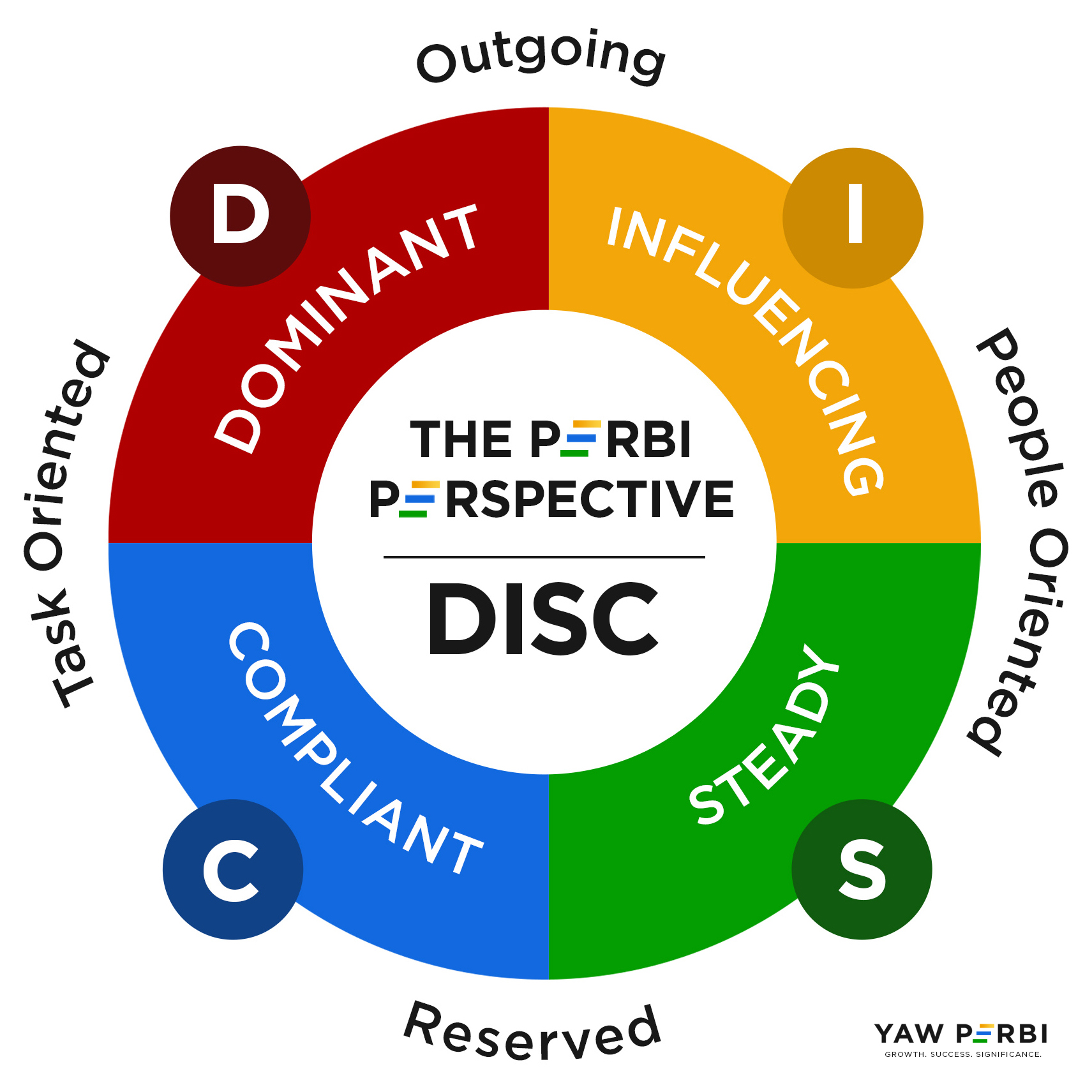
Three Major Benefits of the DISC For You & Your Organization | Your HR Owes You This Assessment
If my DISC assessment results had turned out different, I would not be working as the COO of YAW PERBI Executive Education. When I applied, my employer knew the personality style for the position. Unknown to me, the last interview was to take the DISC assessment. I took it and the results were positive; Peacemaker SC!
I got the job.
Perhaps you’ve encountered different personality assessments out there. But the DISC is the most widely used by individuals and companies around the world.
The DISC is an acronym for Dominant|Direct, Influencing|Inspiring, Steady|Stable and Compliant|Correct. It assesses a person’s personality style as regards their strengths, weaknesses, dislikes, fears and motivations. It also reveals one’s level of strengths of influencing, directing, processing, detailing, creating, persisting and relating in leadership.
Sometimes conflicts arise in the workplace that affect productivity and lead to high employee turnover not because people are bad per se but simply because they don’t understand each other.
Here is how you and your HR department can benefit from DISC assessments:
Benefit #1: Stronger Self-Awareness
The DISC allows you to know your personality style – your strengths and weaknesses, what motivates or discourages you, likes and dislikes, and whether you’re energized or dampened by social interactions. All this information is key in your personal growth and can help determine focus areas for further training and development.
Rather than waste time trying to be like someone else, you should focus on maximizing your strengths and becoming the best version of yourself. And rather than struggle to become strong in your weak areas, you can partner, delegate or hire someone who is strong in that area.
The more you become self-aware, the more you appreciate the differences in others and you’ll begin to treat them as their personality demands.
Benefit #2: Clearer Communication
How we communicate can build or destroy our relationships. The DISC introduces you to the different ways different personality styles communicate and how they process information.
For instance, the Influencing personality style dislikes complex tasks, pays less attention to details and has a low attention span. If you give them a 100-page report to review in two days, you’ll have crucified them. But give the same report to a Compliant personality style who is detailed, systematic and analytical, and it will be a piece of cake.
When stakeholders in an organization appreciate the different ways people communicate according to their personality style, they’ll cooperate better, resolve conflicts faster and reach consensus amicably.
Benefit #3: Tighter Teams
The DISC is useful right from the recruitment stage to determine who has the personality style for the position.
For instance, if a company wants to hire a salesperson who has to be out of the office most of the time to get clients, a Compliant personality type will expire fast! Why? Because they’re introverted and will prefer to sit behind the desk and do detailed tasks like accounts. But an Influencing personality style who is talkative, friendly and persuasive will be thrilled to meet new people and close deals.
It’s also a fact that we’re motivated differently. A Dominant style is motivated by new challenges, authority to take risks and freedom from routine. On the other hand, a Compliant style is motivated by limited social interactions, detailed tasks and standards of high quality.
An HR personnel who understands the personality styles and behaviours of employees will motivate them in ways that speak most to them and create an ideal environment where each style can flourish.
If your HR department is not in a position to purchase a DISC assessment for you, this is an investment in yourself you need to consider. Knowing your personality style and being able to assess the personality of others will enlarge your perspective of self and others, improve your communication and empower you to become a better team player. Unexpected doors open for those who know how to harness the greatest asset in an organization – people.
A DISC is also a perfect gift to give a loved one. Not only will they become self-aware but you’ll know them better yourself too and love them according to the needs of their personality style.
__________________________
If you have any inquiries about the DISC, do not hesitate to get in touch with us via info@yawperbi.com. I am one of the Accredited DISC coaches and Certified Behavioural Consultants with YAW PERBI at your service.
To purchase the DISC assessment Click HERE.
To become an Accredited DISC Coach and Certified Behavioural Consultant Click Here.
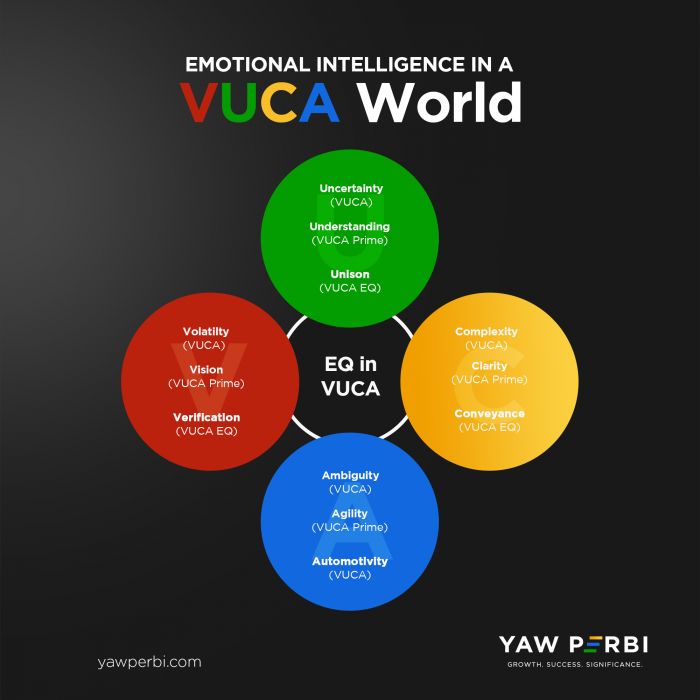
SO YOU THINK YOU CAN LEAD WITHOUT EQ IN A VUCA WORLD?
As one of the Pan African Cohort facilitators of BCA Leadership, I just got off a scintillating Zoom call with amazing African C-level leaders from across the continent—East Africa (like Kenya and Uganda), West Africa (I recall Nigeria, Sierra Leone and Ghana), North Africa (Egypt) and Southern Africa (Malawi, South Africa). We talked about Emotional Intelligence and the whole idea of VUCA. The goal of this blog is to summarize the essentials of the topic, which most participants described as ‘intriguing’: “So you think you can lead effectively without EQ in a VUCA world?” Really, this is a rhetorical question because no one in their right senses would say, “Yes, I can lead effectively without Emotional Intelligence (EQ)” in the first place, let alone in a world that’s described as VUCA.
WHAT ON EARTH IS VUCA?
VUCA is a term that came from the military space, especially at the end of the cold world war when without the two clear polarizing forces the whole world was described as Volatile, Uncertain, Complex, and Ambiguous. Guess what? If the end of the last century was said to be VUCA then imagine just how much more VUCA it is now. Look at the volatility of the world today, look at the speed of transformation, the dizzying digital economy. Consider the uncertainty with COVID-19 and this post-pandemic world. Is it even a post-pandemic or rather para-pandemic world as in some places it seems over and in others, COVID is still raging? Look at the complexity of the world. How could a microscopic virus emerge in a small place in some corner of the world called Wuhan, China, and the whole world gets grabbed into this? Some things are just ambiguous right now. It’s a VUCA world. There wouldn’t be enough space to write out all the feelings these VUCA times have generated in people, especially anxiety.
HOW ABOUT EQ?
Even before the VUCAness of the world, Emotional Intelligence had been identified as the key thing for succeeding in leadership. It is archaic 20th century thinking that IQ (intelligence quotient) makes a good leader for a total leader not only has IQ, in terms of book smarts or cognitive intelligence, but also Emotional Intelligence (EI/EQ) in terms of being intelligent about feelings and Global Intelligence (GQ). Humans like to think we are rational people but at the end of the day we are emotional beings. The term was first coined in 1990 by researchers John Mayer and Peter Salovey, but was later popularized by psychologist Daniel Goleman five years later.
We now know that 80-90% of success in Executive Leadership depends on Emotional Intelligence and not cognitive intelligence. Don’t get me wrong, I am not dumb. I am a medical doctor for crying out loud. Intelligence is important but guess what? When it comes to Executive Leadership, IQ only gets you into the door, it takes EQ to play the game. And win. After about 128, IQ doesn’t matter anymore! Given the same level of IQ, technical skills, and competence, it’s EQ that would make all the difference in how much one succeeds (or not).
Emotional intelligence, according to Psychology Today, is “the ability to identify and manage one’s own emotions, as well as the emotions of others.” It is thus made up of the following four blocks:
BUT THERE’S PROBLEM
So being the amazing leaders we are, we figured out we cannot just sit idly twiddling our thumbs and watch VUCA happen without responding. In 2007, one Robert Johansen (a distinguished fellow at the Institute for the Future), came up with a behavioral leadership model he called VUCA Prime to counteract each of the four elements of VUCA with a specific positive response which starts with the same four letters. VUCA Prime then is to have Vision over Volatility, to overcome Uncertainty let’s have Understanding, then Clarity over Complexity and to overcome Ambiguity let there be Agility.
Well, I have been studying this since the pandemic began and was thinking recently how good VUCA Prime is but how so very cognitive it is! Why is VUCA Prime so cognitive and does not take enough emotions into cognizance especially when we know 90% of success will depend on a leader’s emotional awareness (of self and others) and responses?
WHAT IS VUCA EQ THEN?
Consequently, I have designed something called VUCA EQ to provide a more comprehensive and potent leadership response to VUCA beyond the cognitive, one that significantly takes emotional intelligence into consideration. Like VUCA Prime, each of the VUCA EQ responses also begins with the same four letters.
Firstly, V is Verification: we need to be able to decipher what our emotions are and label them correctly. Then we need to be able to do the same for others as well so we can respond rather than just react, and we can manage our emotions and that of others instead of just trying to control them. The world of command and control is gone!
Secondly, instead of Uncertainty and just responding with the cognitive Understanding that VUCA Prime proposes, we rather respond in Unison. What I mean by Unison is to respond with our three brains. You have the cognitive brain but you also have your emotional brain called the limbic system. EQ is not just a ‘heart’ kind of thing, no! Emotional Intelligence has to do with the brain too. Or even more annoying, called ‘soft skills.’ EQ produces hard results on the balance sheet and cashflow statements! There is the Cognitive brain, Emotional brain, and Instinctive brain and VUCA EQ is about responding with all three in unison.
For Complexity, not only overcome with clarity but with Conveyance. Powerfully transmit emotional then logical information and carry across values and perspectives, considering emotional data and communicating emotions first. Remember to start with emotional data when decision-making and communicating eg. I feel vexxed about this decision and I’m aware most people in the company feel anxious…. Connect with emotions and convey them in response to complexity.
Then finally, for Ambiguity, not only thrive with agility but by Automotivity. In other words, learn to move people’s emotions or move people emotionally. Automotivity means containing within itself the means of propulsion or movement. Mobilize people in such consonance and resonance with what they want (motives) and how they want (motivations) that they move in a self-propelling manner. After all, why do you suppose feelings are called e-motions? Feelings move us, they move the world. We may not like to acknowledge it but they do. How do you learn to know people’s motives and their motivations so that you can ride on that to send them (better still, travel with them) to a place where they ought to go?
CONCLUSION
Leadership is in the transportation business. We move people from here to there and without the power of Emotional Intelligence to move people (think e-motions) towards a shared, noble purpose, we are going nowhere ourselves in the first place and taking no one with us for that matter. Don’t you ever think you can successfully lead, especially in this VUCA world, without Emotional Intelligence.
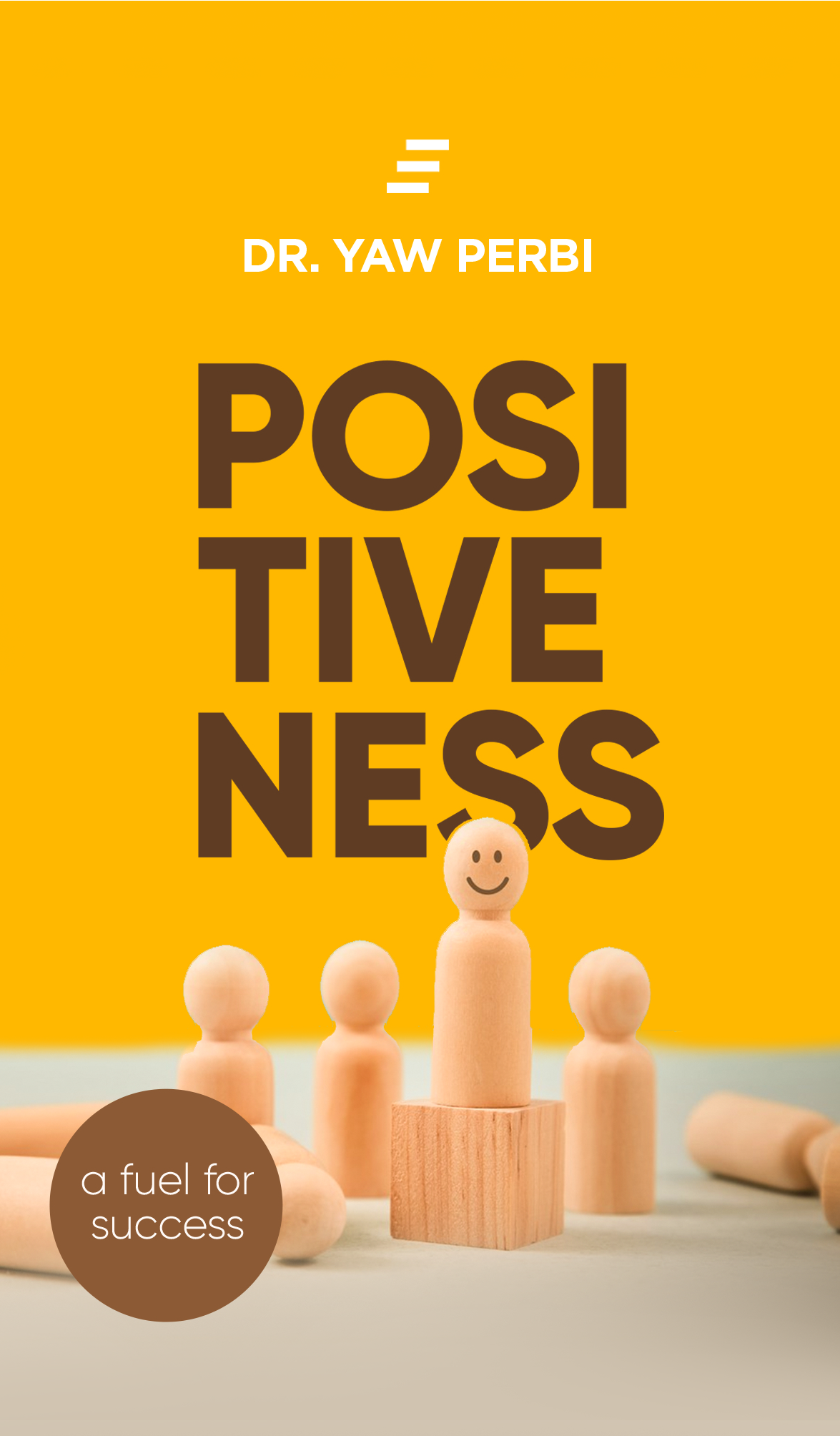
PANDEMIC OR NO PANDEMIC, POSITIVENESS IS STILL A FUEL FOR SUCCESS
The following is a snap peak of the preface to the third edition of Dr. Yaw Perbi’s third book, ‘Positiveness: a fuel for success’, first published in 2003 to commemorate his silver jubilee.
It took a global pandemic to make this third edition of Positiveness: A Fuel for Success, possible. I have been trying to republish this book for nearly a decade now. The revised manuscript was done in 2012, and I had nearly completed the back-and-forth with a publishing company. All was ready to go, or so I thought. Then life happened and I put this on the backburner. Until now. It took the lockdowns of the Coronavirus pandemic of 2020 to get this going again.
I have changed a lot since I turned 25 and first launched this book and so have many things too. We didn’t even have smartphones back then, and the internet was still a novelty. But some things have remained the same. After thousands of copies sold and many countries reached, “through all the changing scenes of life, in trouble and joy,” what hasn’t changed is the fact that positiveness is still fuel for success.
In the past two decades, I have lived and worked for a year or more in three countries on two continents. In doing so, I have needed a whole lot of positiveness, especially in those times when I was geographically separated from my family. I have formally had various occupations and preoccupations ranging from being a medical doctor in Ghana, a military captain with the United Nations in Cote d’Ivoire, a leadership consultant and speaker around the world, pastor of a Chinese congregation in the French city of Montreal, a financial security advisor and investment consultant, to being president of a couple of Canadian and global charities. Positiveness is still fuel for success no matter the field of endeavour.
You see, this book was only my third book and, back in 2003, I wrote and self-published it with a white cover and silver inscriptions to celebrate my twenty-fifth birthday (silver jubilee). At the time, I was a struggling medical student in Ghana attempting to do ‘what Napoleon couldn’t do’. I was trying to straddle the world of medicine and human development. In May 2003, together with a group of friends, while still in med school, I founded The HuD Group to inspire and empower young people to reach their full potential. Now I am a full-fledged medical doctor who has hung up his stethoscope— after four years of clinical practice—to focus on human development, especially holistic leadership development, because I sincerely believe, like my mentor John C. Maxwell, that “everything rises and falls on leadership.”
The HuD Group began in Ghana but, at the time of writing this, I am feverishly coordinating our global operations in two dozen countries on all continents of the world and currently domiciled in Montreal, Canada. If I thought I needed a daily prescription of positiveness back in 2003, then I might need a thrice daily prescription now. The two-year battle with the Canada Revenue Agency alone to get charitable status for The HuD Group warrants a book on its own. I’ll save that for another day, but it took positiveness to fuel my success.
When I was much younger and naïve, I dreamed of working with the United Nations. And unlike many for whom that is still a dream, I achieved it. I did that, for a year, in La Cote d’Ivoire. Even while already enjoying that success, I still needed positiveness as fuel when I got car-wrecked on July 21, 2008 and lost two of the military colleagues I was travelling with. It was positiveness that got me back on the road to recovery. My commanding officer, out of rare soldier-sympathy, wanted me to return home (to Accra, Ghana) and recuperate but cheers to positiveness, I was convinced to stay put and serve with grace. I prevailed. Positiveness prevailed.
So yes, life has changed—a whole lot— and so have I since 2003. Now married to my dear wife, Anyele, and a father to seven amazing children, I certainly have a broader and deeper perspective on life today. But if anything, these changes have only affirmed and confirmed the principles that were penned in this book nearly two decades ago. Positiveness is fuel for growth, success, and significance in any and every endeavour, and at whatever age and stage in life, that hasn’t changed.

From One Legendary Leader in the Evening to Another One in the Morning–a Tribute to Archbishop Desmond Tutu

The beloved late Desmond Tutu (photo: Yaw Perbi does not own the rights to the picture and owner is unknown).
I was emailed this incredible tribute by a mentor of mine in the Lausanne Movement, Dr. Michael Cassidy, to his late friend Archbishop Desmond Tutu, that I just had to share as a student of leadership. What impresses you most? May many Cassidies and Tutus be raised in our generation!
Tribute to Archbishop Desmond Tutu
from
Michael Cassidy
Founder, African Enterprise
Honorary Chair, The Lausanne Movement
Archbishop Desmond Tutu, one of South Africa’s greatest ever luminaries, both ecclesiastical & national, has gone to be with His Lord. People from every race, sector & background will mourn his passing, because he was a man for all who stood without fear or favour for the human rights of all.
Perhaps it is as an almost unequalled African champion for human rights that he will be most fondly & universally remembered. And it was for this that he justly became a Nobel Laureate.
In South Africa his immensely courageous fight against Apartheid earned him the fearsome opprobrium of the National Party Government, the settled hostility of most whites, but the thankful adoration of all people of colour, as well as more liberal whites. In fact, from the church, his voice during those dread years, was by far the most audible, & his persona by far the most visible. This audibility & visibility constituted a true achievement of note & contributed powerfully to the final fall of Apartheid.
As far as we were concerned in African Enterprise, Desmond was a friend to our work & contributed powerfully to conferences we organized or helped organize such as SACLA (South African Christian Leadership Assembly), the NIR (National Initiative for Reconciliation), & The Rustenburg Conference which represented the whole church spectrum & spoke to the whole range of political leadership from far left to far right.
At a personal level I also counted Desmond a good friend. He commended numbers of my books, including my recent Memoirs, & wrote the Foreword to my book The Politics of Love. We also shared in significant ministry together in African Enterprise’s city-wide mission to Kigali, Rwanda, a year after the genocide. That was very moving. I especially remember ministering with him in terrifying cells of pitifully jammed together prisoners. And then being with him as he collapsed in tears in one church filled with skeletal remains of murdered victims. There I saw his profound compassion poured out. Even as we tried to hold him up. Such shared moments one can never forget, culminating in our sharing the evangelistic preaching to a packed stadium in our final service.
And all this Desmond could do in spite of the fact that we had strong theological differences on certain issues such as Universalism & Gay Marriage. But he never allowed those to damage our friendship. And neither did I.
Thankfully in our recently produced documentary, The Threatened Miracle of South Africa’s Democracy, Desmond features strongly, both during the Apartheid years, but even afterwards when he severely scolded the ANC of Zuma’s time saying, “I’m warning you; I’m WARNING you; you are a disgrace!” No one else had that truly prophetic courage, credibility & ability to speak to all sides, all the time, AND be heard!
Yes, we will miss him… “the Arch”, as he was affectionately known, even by the media. But his legacy of prophetic witness will live on wherever South Africa’s story is told, & wherever racial justice & the Human Rights struggle are in purview.
To his dear, always supportive wife Leah, to his family, to his ministry colleagues, especially in the Anglican Church, we in African Enterprise world-wide extend our deepest sympathies, & assurances of heart-felt prayers at this time.
Dear Desmond — Beloved Arch — thank you for blessing us with your life. Au revoir. We will see you in the Morning.
Michael Cassidy
Founder of African Enterprise
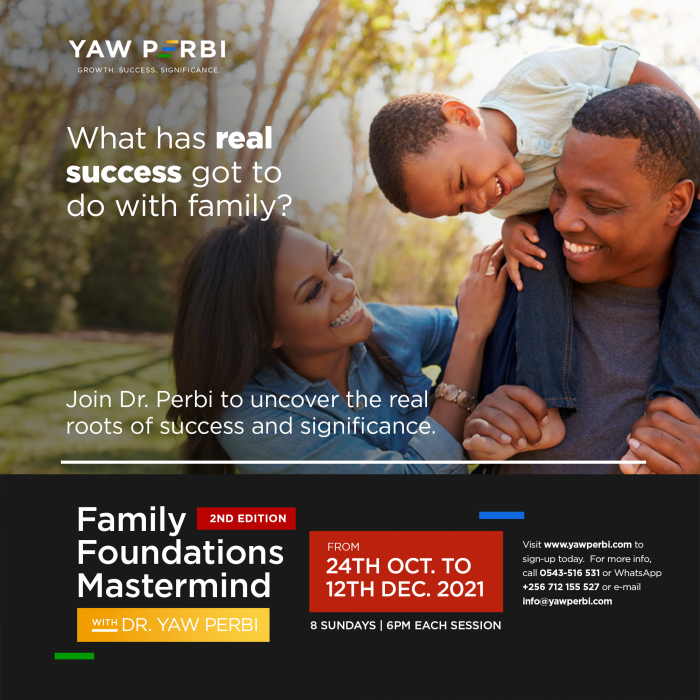
Family Foundations and Success: Will Your Anchor Hold?
We live in perilous times. Don’t you sometimes feel like the world is spinning out of control ? One of the most important things we must cherish and hold on to is family. Every single one of us has a family–no matter how (dys)functional and emotionally or geographically removed. The family is the fundamental unit of human existence. Nothing good happens on Earth if it is broken or destroyed. A society is only as good as the families that constitute it.
It is not only the concept of family that is important but also the actual living out of what family should be. Humans are described as social creatures. We make friends, live in communities, and connect with strangers based on common elements. Social media has recently emerged as a new way for people to connect with childhood peers, friends of friends, and even strangers. Nothing is more central to social life than the concept of family. Our families represent our earliest and, often, most enduring relationships.
Earlier this year, a Family Foundations Mastermind was held, with a sizeable number of couples (and some individuals) participating. All present could see that there are important things everyone should know, be, and do about the family yet no one had done! How can we expect family to be strong and stable if we ignore the fundamental roles of human existence? As a result, a popular request has been made for it to be repeated, even though we had planned this quarter to run a Financial Whizzdom Mastermind, which many were anticipating. We apologize for any inconvenience, but signing up for the upcoming Family Foundations Mastermind would never be a mistake.
With what is going on around us in this LGBTQI+ era, there is an urgent need to apply ancient wisdom and put current family systems theories to the test. The abiding questions in the 19th century hymn Priscilla Owens come to mind:
“Will your anchor hold in the storms of life, when the clouds unfold their wings of strife?When the strong tides lift, and the cables strain, will your anchor drift, or firm remain?”
We encourage everyone to participate in this mastermind as it will be both enjoyable and educational. We will explore:
Why a systematic study of family itself is important
The prime place of family (get ready for paradigm shifts!)
Ancient family wisdom (we’ll apply these)
Current family systems theories (we’ll test some)
Basic tools for emotional connection
Essential communication tools
The forgiveness exercise
Unique emotional needs and how to fulfill them
Mapping out your family genogram
Drawing up a family mission statement
Prioritization: Recognizing the place of work, family, friends, church/community, and other responsibilities that require your attention.
The idea of the integrated life over the notion of balance
And much more!
Note that this is not a masterclass but a mastermind. Inasmuch as there will be some core teaching, more central will be the concepts and tools that are put on the table for everyone to contribute their perspectives and experiences and practically learn together things together that no one could have taught us. Dr. Yaw Perbi is a guide by the side in masterminds rather than a sage on the stage, typical of a masterclass.
WHAT’S SUCCESS GOT TO DO WITH FAMILY?
Everything. As John C. Maxwell poignantly puts it, success is when the people who know you the best (family) love and respect you the most. Join this journey of growth to discover the real roots of success and significance. Family is essential. Whatever we see in society has a direct correlation with family. The family is the fundamental unit of society and humanity. We can discuss all seven sectors of life or spheres of influence, but only family actually produces human beings. Come learn how to be a better family member and how to be/do family better.
We are excited to have you. Register via this link as soon as possible. First come, first guaranteed.

4 F’s for Finding the Right Life Partner
A special shout out to Naa Anyele Perbi, my wife, economist-entrepreneur and CEO of Perbi Cubs. It’s my wife’s birthday (October 3), my wife of 15 years and counting, and as I celebrate her it seems to me that the rest of the world could benefit from 4 F’s that are critical in building a lasting marital relationship a.k.a. life partnership. Marriage is tough in and of itself and so starting with the ‘wrong’ partner is literally starting on the wrong foot. Anyele and I have been asked “how do I know for sure this is the right life partner for me?” so many times that we’ve distilled the answer down to a simple 4 F criteria. Of course, you could have 100 characteristics of the (wo)man of your dreams–why not?–but if you get these four wrong, forget the other 96!
Now, this is not just for young(er) people. Increasingly many people are getting married later in life but not just that, stuff happens. There are those who marriages end sooner than they had hoped and choose to remarry–and want to have a partner that will last this time. Here are our four: faith, future, friendship and feelings.
(1) FAITH
Faith is number one because it drives everything else. I’ll explain: people do not realize that our entire existence and behaviours our shaped, driven and undergirded by values, which in turn are determined by our beliefs (or as some call them, ‘faith assumptions’) which at the very core come from our worldview!
There is a lot of talk about values-based this and values-based that but values are only fruits of the tree; the roots are fundamental beliefs in the fertile soils of worldviews. So what kind of faith do you subscribe to, or no faith? I know people try to cross faiths, like Christian and Muslim marriages, but we really believe it is important to share a common faith because then you have a common worldview, common belief system, and common values which should lead to common behaviours to do life together that lasts, with unnecessary tensions and fight.
The apostle Paul, who incidentally never got married, waxes lyrical about this to the Christ followers in the ancient Greecian city of Corinth. He pulls no punches as he gives it to them straight up: “Do not be unequally yoked with unbelievers.” For Christians who are true disciples of Christ, the reasons and reasoning I’ve provided above which must’ve informed this command, in additional to spiritual reasons he gives in the text, may be useful to know but obedience nevertheless is the highest value in the kingdom of God. It’s also known as love for God.
(2) FUTURE
You may be two people of the same faith (so values, beliefs and worldview are in sync) but if you are going in two different directions in life, it’s not going to work. First it’s a tension and soon it’s a tear. And this has nothing to do with someone being a ‘bad person’ or the other having ‘no love’ but just because you have two different life purposes that aren’t complimentary let alone synergestic. By future we are talking about purpose compatibility. Two people may have common faith but if they are traveling in two different directions because they were made for two different destinations and destinies, the marriage partnership won’t work. I like the way a friend put it: “we are good; but we’re just not good together.”
Everyone has a specific God-given purpose that must not only be discovered but developed and fully deployed if we are to feel fulfilled. It doesn’t mean both must be doing the same sort of work or in the same field even (all they better if they are). It just means they have the passion and compassion (and perhaps even talents) to contribute to the purpose. Being fulfilled can be described as getting oxygen, and you know how any human being will instinctively fight for air if they are being choked. A life partnership will never work even if you are two people of the same faith yet moving in opposite directions, or towards different destinations and destinies.
It is critical that you discuss the future and truly understand what you are getting involved in during courtship. During courtship, the lips are for talking primarily, not kissing. You can never suck information from the mind of another no matter how much you French kiss a loved one! Decide to go into details about where you’re headed and how you envisage life in the coming years. It is not for nothing the good book inquires, “Can two people walk together unless they agree?”
(3) FRIENDSHIP
Friendship is the cornerstone of a lasting relationship, and a good friendship is intentionally formed over time. One of life’s greatest pleasures is friendship. Friendship is wonderful because it is one of the few relationships in life that fosters equality and mutuality. Almost every relationship in the world has a power differential, someone one higher than the other; not so with friendship.
If the creation account is true, then man and woman were made for each other for companionship (friendship) even before parenting for their life’s work (‘future’ above) or procreation. The other thing is that emotions come and go, but friendship endures and transcends the passage of time. Affect(ions) alone cannot always sustain a marriage. Friendship with all it entails is a truly priceless relationship. Life can become monotonous if we do not have some true friends to share it with.
It’s so cute to find an elderly couple who are truly friendships–the body language, the mannerisms. I’ve met many people, especially young ladies, who somehow seem to believe that they will never be able to marry their friends. Au contraire! Marrying your friend is the best decision one could ever make!
(4) FEELINGS
Finally, feelings are the icing on the cake of a life partnership that literally lasts a lifetime. Emotions are extremely important and should never be overlooked. They are powerful. They are called e-motions for a reason. They move us. There is a need to feel and this is a requirement for you and me to be exceptionally attracted to our partners. There must be a special thing that draws you to the individual and creates a natural flow between you two. Call it ‘chemistry,’ if you will, or that the person lights your fire. There is a need for connection and a spark between the individuals. It is key because you’ll be waking up by the side this person almost every morning for the rest of your life–you had better get some kick out of that!
There tends to be two extremes when it comes to the role of feelings in choosing a life partner. There’s the feelings don’t matter camp which gets it wrong (of course they do!) as well as the feelings first (or even feelings only) base as well. We absolutely need the feelings to make any life partnership last, but I won’t make them first or foremost. Take a look at Hollywood: more than half of the hunk-ness, über beauty, sexiness and extreme marriage proposals (on helicopters and such) result in divorces within months. Months!
Feelings are important but there aren’t everything. I remember learning 25 years ago when I was a World Vision Youth Ambassador that generally people in the West marry the one they love (have feelings for) while those in the Eastern hemisphere love the one they marry. Even arranged marriages can work if they get the first three F’s right. The fourth ‘F’ can eventually come along. In fact, many of them outlast the so-called “love marriages’ which largely focus on just the fourth ‘F.’
FINALLY…
Many people I know have a long list of life partner criteria. Every one of those lists can be divided into two: essentials and desirables; or non-negotiable and negotiable. You can add a whole list of both categories to Faith, Future, Friendship, and Feelings but these four are non-negotiables. You can have an expanded list of 100 criteria but you cannot do without these four–not if you’re serious about a life partner for a lifetime. Ascertain that these 4F’s are in place for a future with your partner that has a lifelong glow and not just a shooting star. The quality of the information you have directly impacts the quality of the decisions you make. You are in charge, therefore, make the best decision. See you at the summit!
Please share your thoughts and experiences too!

